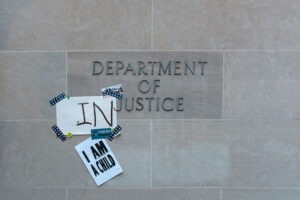
June 19, 2018; Slate
As the country’s humanitarian crisis on the US-Mexico border continues, one bright spot has been the incredible level of financial support flowing into one Texas nonprofit, the Refugee & Immigration Center for Education & Legal Services—RAICES.
A social media–driven fundraiser for RAICES become the largest in Facebook’s history, with more than $17 million donated as of Thursday. The San Antonio-based nonprofit is the largest immigration legal services provider in Texas, with free and low-cost services for immigrant children, families and refugees in central and south Texas.
The fundraiser was begun by Charlotte and Dave Willner, NPQ reports, a couple from Silicon Valley who were some of Facebook’s earliest employees.
Founded in 1987 in response to increasing migration from Central America, RAICES now joins the venerated group of organizations, including the ACLU and Planned Parenthood, that have seen a windfall of funds since the 2016 post-election surge of “rage donations,” which may actually be better defined by hope.
Naturally, many donors are wondering what the organization will do with all of that money and whether it’s cynical to question the funnel flowing to a single entity. Slate’s Felix Salmon argues that we can feel good about donating to RAICES because the organization can scale “without limit” to fund the immigration bonds that parents need to be released from detention and, hopefully, reunited with their families:
Effectiveness of donations is hard to measure at the best of times, but it’s much easier than normal in the case of RAICES, because of the way in which the funds are going to be used. To put it another way: The RAICES money will be well-spent, not because we can be sure that RAICES itself is well-managed, but rather because of what it’s going to be spent on.
[…]
A permanent bond fund, which has the resources to bail out every detained parent, and ideally every wrongfully detained immigrant, is a fantastic public good, and once it’s seeded with enough money, it can operate almost indefinitely.
On one hand, we shouldn’t discount certain, seemingly uninformed, reasons for donating to viral campaigns. (Salmon criticizes the ALS Association as a “random choice” for funds raised by the Ice Bucket Challenge—and indeed there is discord among its members over how that money is to be spent.) At a time when nonprofits and civil society are under siege, money is a step above a retweet or signature on a petition. On the other, it’s fair to ask: How should a person feel about being part of this particular multimillion-dollar fundraiser?
While Salmon focuses on where the money will be spent as a measure of effectiveness, he also misrepresents RAICES as an obscure “small shop,” which conjures up images of a bootstrapped, volunteer-run office. In 2016, RAICES reported revenue of $7 million and $5.5 million in expenses, with $3.5 million in assets and $275,000 in liabilities. It’s a good thing that the organization is scrappy, but also has enough structure in place—including 130 attorneys, legal assistants and support staff—to scale up quickly with the right advice and networks. Executive Director Jonathan Ryan, an attorney, has led the organization for more than 10 years.
Further, the organization has shown a high level of capability during a challenging period of scrutiny. The staff made quick use of technology to organize Facebook Live updates on the fundraising campaign and its response to rapidly changing legal news, plus an FAQ list on Google Docs. When the RAICES website crashed due to the traffic, there were also frequent updates, and a video highlighting reunited families and the organization’s diverse staff was pinned to the top of its Twitter feed.
Sign up for our free newsletters
Subscribe to NPQ's newsletters to have our top stories delivered directly to your inbox.
By signing up, you agree to our privacy policy and terms of use, and to receive messages from NPQ and our partners.
Staff frequently expressed gratitude to donors—a best practice for converting one-time contributors into loyal supporters—in the updates.
“We’re incredibly overwhelmed by your generosity and by everything that’s happened for our organization,” said Manoj Govindaiah, RAICES’ director of family detention, in a Facebook Live update posted Wednesday.
We really ask you guys to bear with us a little bit as we try to address the many questions that we’ve gotten on Facebook and from our supporters….We really did not anticipate such an overwhelming response and we are also trying to figure out how we can most effectively use the generous donations that you’ve sent our way….The signing of this executive order is really just the start of another fight.
RAICES staff members said they are “making these plans as we speak” and would focus on better integrating services to address the social and mental obstacles faced by undocumented families, beyond their legal challenges, and interviews are underway for new staff.
Mayra Jimenez, director of the children’s program, spoke about a recent cut in funding to one of the organization’s programs for unaccompanied minors, which provides universal legal representation no matter the strength of the child’s case. Thanks to the influx of donations, RAICES will now be able to accept new cases into the program.
“We absolutely believe that no child…should ever go to court by themselves,” she said.
Staff also highlighted a new coalition of like-minded organizations that will centralize data and efforts to reunite detained children and parents.
Govindaiah also expressed gratitude for the large number of people who have volunteered to help RAICES while tactfully addressing an issue faced by many nonprofits: how to engage non-expert volunteers who want to “give time.”
“One thing that a lot of nonprofits don’t have a lot of capacity to do is manage volunteers, train, supervise, oversee logistics,” he said, adding that RAICES would work with partner organizations to utilize new volunteers in the future.
Barbara Peña, assistant director of outreach, asked for patience as she tried to sum up the experience of winning the nonprofit lottery.
“We continue to see those numbers climb, and it is really just sort of a special moment,” she said. “We’re grateful that all of you are sharing that with us, because it’s a testament to not just the importance of the work…we [also] know that people who are new to immigration issues are taking note of the climate that we find ourselves working in.”—Anna Berry












